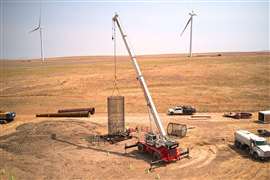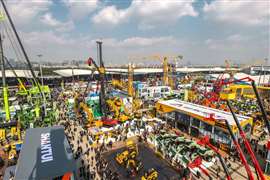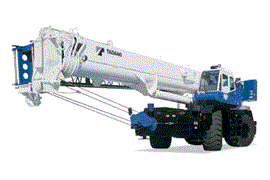Recession felt in Middle East
06 March 2009

The Middle East is still a hive of activity but the region is starting to feel the affects of the global economic slump. Euan Youdale reports.
For some time, crane operators in the Middle East have been viewing the credit crisis and its ramifications around the world and wondering when it would hit them. The answer has come in the last couple of months, with a number of cancelled and postponed projects. In December, Dubai-based property developer Nakheel suspended work on its Trump Tower project. The AED 2.9 billion (US$ 790 million), 62 storey, 270 m tall structure is intended as the centrepiece of the company's Palm Jumeirah artificial island scheme off the coast of Dubai.
On the other hand, in the same month, Nakheel also unveiled plans for a new off-shore development called The Universe. The project will be close to its Palm Jumeirah development and inshore from its 500 island World project. The scheme reflects the general view that the construction fever will pick up again.
Crane rental company House of Equipment has taken some advantage from the credit crisis. "There is increasingly a non-availability of cash and financing to encourage contractors to buy," says Waiel Manfalouti, House of Equipment general manager.
This is combined with the fact that lifting work is becoming more common due to the increase in pre-cast construction, which saves time on the project site.
The company is predominantly active in Saudi Arabia, Qatar and Abu Dhabi where, Manfalouti says, the availability of cash is reasonable.
In the last 12 months the company has bought 18 rough terrain, all terrain and crawler cranes from Locatelli and Manitowoc, with lifting capacities from 45 to 250 tonnes. This amounts to a 70% increase, in monetary terms, on the previous year.
Slowdown
House of Equipment has also invested in 40 tower cranes for rental and another 200 in its trading wing. The future, however, looks less certain. "The slowdown has started and it may continue for up to 24 months. High rise applications will be affected, while horizontal [housing] is less affected and infrastructure projects will be least affected," Manfalouti comments.
As a result the company says it will invest in infrastructure related equipment.
The most popular mobile cranes of choice in the UAE are still 100 and 70 tonne capacity machines, according to Brian Green, heavy crane manager at Al Faris Equipment Rentals. They are used across the board in construction and in oil and gas.
Rental rates, however, have dropped about 10% over the last few months, says Green. "At the moment we are okay and are on long-term projects but it might be the middle to end of this year that things will get difficult." This, adds Green, is most apparent in the construction market. Oil and gas projects, on the other hand, are not being cancelled but, in some cases, they are being postponed.
According to Green, the downturn in the Middle East "came out of the blue. We new it would come but it came so quickly, that was the big shock; everyone was a bit taken aback. But I think it will pick up again, especially in Dubai."
In talks
In 2008 Al Faris ordered 34 cranes, ranging from 55 to 250 tonnes capacity, all terrains, rough terrains and crawlers. All terrains and crawlers are from Liebherr, while the rough terrains are from Tadano. As a result of the credit crisis, Green says Al Faris is now in talks with the two manufacturers about orders planned for 2010. "We had 34 cranes this year I cannot see it happening in 2009 to 2010."
Green envisages that manufacturers could be forced to cut their prices. "This [credit crisis] could be a good thing; we may be in position to start negotiating in the middle of this year."
Green also makes the point that a slowdown may give those involved with fast-turnaround projects time to breathe, allowing a greater degree of planning and thought.
Of course, the downside to the slide for rental companies is a drop in utilisation rates. "All the cranes used to be out, now we see one or two cranes in the yard," says Green. Although, he adds that a majority of the fleet is out on long-term rental, with only 30 to 40 machines being used as taxi cranes. There is also little room for crane rental companies to diversify in the region, says Green. "We have oil and gas and construction and we have aluminium, so you can't diversify here as you may be able to do in Europe."
Green adds, "If we get through this year and into next year things will start coming back and people will have money in their pockets to rent cranes again."
Investment
Eric van Sabben, business development manager at alternative lifting and specialized transport company TTS International, says it has enjoyed a lucrative 2008 and, like many others, is expecting a good first half this year. TTS has invested in a range of jacking and skidding equipment designed in-house and built at the Dubai-based workshop. One of them is a 12,000 tonne capacity skidding system under construction. It will be first used for the load-out of a topside module in the second quarter of 2009.
Van Sabben says a large majority of the projects commissioned last year are still underway or have been confirmed. The problem potentially starts in the second half of 2009, when those projects have been completed.
Due to TTS's involvement at the end of the oil and gas module construction phase, at which point it performs the load-out and transport, a downturn in business will be delayed until that is complete, which could even be the first half of 2010. "We hope we can sustain the business that we have at the moment but I don't think we will have much chance of increasing that in 2009," van Sabben adds.
Oman potential
TTS splits its activities between infrastructure, civil and oil and gas. As far as infrastructure is concerned, van Sabben explains that the shortage in some areas, including Abu Dhabi and its road network, means there is still significant government investment.
One major project on which TTS will be employed for the next 18 months is the Khalifa Port and Industrial Zone, which will incorporate a jetty supported by 60 tonne concrete beams. They will be transported from the casting yard by TTS.
TTS is also moving into less well-trodden countries, including Afghanistan where it is helping to construct a power station. TTS is transporting 84 tonne US-built engines that have been shipped from Germany to Sharjah, UAE, and airlifted to Kabul. The work involves skidding the engines out of the aircraft and transporting them.
Oman has been targeted by TTS, where the company is starting a joint venture. The benefits for TTS will come thanks to the country's aggressive development of its gas industry, according to van Sabben, and its close proximity to Dubai. The plan is to take the advantage early and become a recognised service provider. "New developments are growing fast. It is not a big country but there are not many companies active there. At the moment there is not the heavy equipment there, so it is coming from other places." Van Sabben continues, "Oman is being hit by the same economic situation so we cannot say those projects that have been started will complete but, irrespective of that, there is still a good market in Oman and we want to be part of that. In a few years, when others arrive, we want to be established," adds van Sabben.
Iran is providing a limited amount of work and TTS is supplying barges for a pipe-laying project in the country, a job set to continue into mid-February 2009. But it is not easy doing business there, says van Sabben and the country already has four or five established heavy lift companies carrying out a majority of that work. Having said that, equipment for 1,000 tonne and heavier lifts has to come from outside the country. "Even to set up a bank account is a painstaking process, so we work there but not that often. While we can find business elsewhere, we will do that," adds van Sabben.
Reduced sales
Manufacturers are, of course, also being hit by ripples caused by the sudden downturn in the region. Wolfgang Beringer at Liebherr says that over the last three to five years sales of three to five axle cranes have "exploded" in the region, with larger capacity cranes up to 500 tonnes also in high demand. Rental giant Al Faris took delivery of its biggest mobile crane - the 1,200 tonne capacity LTM 11200-9.1 - in 2008. "Also, the number of customers was increasing as new ones came to the market." Of course times have changed rapidly and the recently developing high capacity crane market is now seeing a reduction in sales.
The same is true, of course for the smaller models. In the UAE, Beringer says, crane orders are being cancelled due to delays and cancellations of projects. In the neighbouring "oil and gas countries," including Kuwait, Qatar and Bahrain, there is also a slowdown as new oil refineries, or extensions to existing ones, are put on hold as a result of declining oil prices, according to Beringer. The same is true in Saudi Arabia, although the slowdown is not as pronounced thanks to large-scale infrastructure projects that are still underway.
"A forecast is difficult," adds Beringer. "But, if the oil prices rise again, many projects will come back up."
Chinese manufacturer Zoomlion is selling medium to high capacity tower cranes into the gulf area, ranging form the TC 5013B to the TC 7030B, which are finding work on infrastructure and residential construction sites. The company adds that the trend is towards higher capacity tower cranes, "but mainly for luffing jib cranes because they are more convenient and easier to operate due to more stable adjustments and bigger load capacities, while, at the same time, they can save space."
In the future
Future applications will obviously depend on the region's economic situation and policies, according to a company spokesman, but it will also be led by technological innovations from the tower crane manufacturers. With regard to infrastructure the company believes it will benefit from continued investment, even with the backdrop of a global recession, should one occur.
In residential construction there is a notable drop off. "Some big real estate companies have either cancelled or put off their projects due to a shortage of funds."
Crawler crane manufacturer Sany says it selling mostly 25 to 100 tonne capacity cranes into the Middle East with the 25 and 50 tonne models being the most popular. According to a Sany spokesman this is unlikely to change in the future. "There is no request for higher capacity machines at the moment. The reason is unknown, maybe because of the financial crisis," says the company spokesperson. "The economic situation has great negative impact on the sales of crane. The market demand is collapsing sharply because of limited demand. All the crane manufacturers are confronting the same problem of demand declining."
Fellow Chinese crane manufacturer Shenyang Sanyo (SYM) echoes the same sentiments. While luffing jib tower cranes have become more popular over recent years and are expected to become increasing popular in the future, the number of construction projects is falling away. "The inquiries and orders have been declining since last November, in general. Some projects are stopped and postponed in this region," says Chen Yu, company spokesman.



